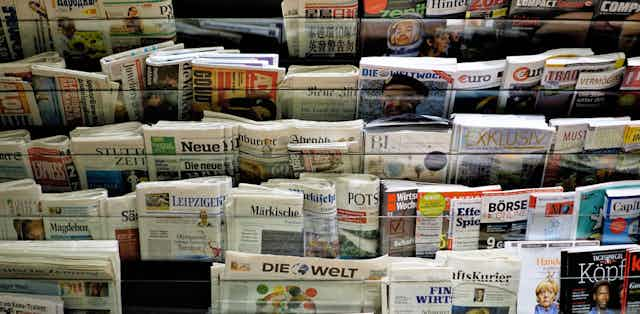The British press is regarded by the rest of the world as notoriously raucous. If you need an example of how raucous, the way British newspapers have reported Brexit is only one recent, if much-discussed, example. Headlines such as “Who will speak for England?”, “Enemies of the people” or “Draw a red line on immigration or else” stirred up controversy and put the media’s role in political and democratic debate into sharp focus.
Some journalists and editors exercise considerable political influence. When, for instance, Paul Dacre stepped down from the editorship of the Daily Mail in June 2018, more than one commentator expected, as The Guardian’s media editor Jim Waterson put it: “substantial implications for the government”.

But how do British journalists themselves see their role in society? Do they consider themselves aggressive opponents of those in power? Do they aim to influence politics? Do the attitudes British journalists hold about their profession confirm what the ex-journalist-turned-spin-doctor Tom Baldwin wrote in his recently published book, Ctrl Alt Delete, that journalism is “no longer a ‘trade’ for some people but an attractive career for the kind of person who might otherwise have wanted to run the country”?
A German juxtaposition
To find out, we compared British journalists’ professional attitudes to those of journalists in another country with a similar media landscape but a more muted press: Germany. German media tend to be noticeably more restrained in their coverage of controversial issues than British papers.

For example, during the 2017 general election the Sun warned voters not to “chuck Britain in the Cor-Bin”, adding a photomontage of the Labour leader, Jeremy Corbyn, in a rubbish bin for clarity. In the same year, ahead of their country’s general election, German newspapers were offering a “manual” for “better voting”, carefully avoiding taking sides. Are these apparent differences reflected in how journalists in both countries see their role in society?
We used two representative surveys of British and German journalists to analyse the professional attitudes of both groups. Both surveys were part of the Worlds of Journalism Study, which brings together researchers from 67 countries, including the UK and Germany. Between 2012 and 2016 over 27,500 journalists across the world were interviewed, using a common methodological framework. The survey of British journalists was conducted online in December 2015.
The German survey was conducted by telephone and online between November 2014 and August 2015. The final samples consisted of 700 British and 775 German journalists. Professional journalists across all media types: newspapers, TV, radio, magazines, news agencies and online media were included.
Probing positions and practices
To find out how British and German journalists perceive their role in society, we analysed six groups of questions. The first explored how much journalists believe they should intervene in politics and society. Journalists were asked how important they consider setting the political agenda, influencing public opinion, advocating for social change, and promoting tolerance and cultural diversity.
The second group of questions investigated journalists’ relationship to those in power. We asked respondents how important they feel it is to monitor and scrutinise political leaders and business, to be an adversary of the government or to support government policy, and to convey a positive image of political leadership.
Then we asked about journalists’ relationship to their audiences. We examined how much they focus on providing entertainment and relaxation, providing the kind of news that attracts the largest audience, providing information people need to make political decisions, and motivating people to participate in political activity.
Our fourth group of questions centred on how journalists report facts. The survey asked whether journalists thought it was important to be a detached observer and to report things as they are, or whether they preferred to provide analysis of current affairs.
Lastly, we examined ethical attitudes among British and German journalists, asking whether journalists considered it essential to adhere to general ethical rules such as codes of professional ethics, and also about their attitudes towards specific practices such as publishing unverified content.
Confrontation, contextualisation, conformity
Our statistical analysis revealed several significant differences between journalists in Britain and Germany. Most importantly, we found that British journalists believe it more important than their German colleagues to confront those in power and hold them to account. But – contrary to expectations – we found no difference between British and German journalists’ eagerness to set the political agenda or influence public opinion. The second significant difference we found concerned how they thought they should report reality. Whereas British journalists tend towards objective, factual reporting as detached observers, German journalists see their role as more analytical.
We also detected differences between British and German journalists in regard to their ethical ideologies: German journalists proved to be significantly more rigid in their general ethical stance whereas their British colleagues felt freer to follow their own personal judgements. Interestingly, though, this difference in ideology was not reflected in what journalists thought about specific ethical practices. Here we could not detect any significant differences between both countries. We also found no significant differences in how journalists in Britain and Germany relate to their audiences.

What we found was that – despite an eye-catchingly partisan press in Britain – the country’s journalists are not more determined than their German colleagues to set the political agenda or influence public opinion. But they do consider it significantly more important than German journalists to confront those in power and hold them to account.
Individual journalists, such as Dacre, who have exerted a considerable influence on British politics, are not reflective of the attitudes of British journalists as a whole. Instead, journalists such as Amelia Gentleman, who unearthed the Windrush scandal, or Carole Cadwalladr, who doggedly investigated the role Cambridge Analytica played in the Brexit vote, appear to be more typical of what British journalists think they should do: scrutinising and standing up to those in power.

